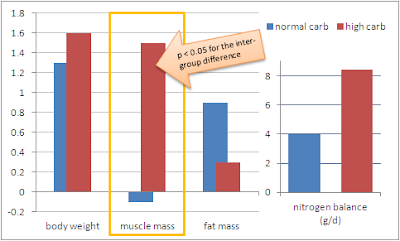If you had told one of the forefathers of physical culture that he was not allowed to have oats with his raw eggs and that the milk he was adding had way too many carbs, what do you think he would have said? I guess, he either would have laughed at or pitied you (depending on whether you are already in the "chronic fatigue phase" of low-carb + high intensity training, or not), but he would certainly have complained if you had taken his oatmeal, his milk and his rice and substituted that with bacon, butter and cream - after all, he would have those whenever he felt like it, as well....
All carbs are not created evil and how evil they are largely depends on their consumer
But enough of these preambles let's face it: If you are already lean and want to stay sane while training heavy to maximize your gains and performance you need carbs! And while it certainly depends on the individual how much of those allegedly fattening molecules you can / should ingest on a daily bases, a recently published study from ??? suggests that, as a young (18-35y), yet still somewhat experienced strength trainee (>2y of training experience; body weight: 77kg; body fat: 16%) you can hardly get enough of them (Mendes-Netto. 2011).
 |
| Figure 1: Macronutrient composition of the habitual, "normal carb" and "high carb" diets (from Mendes-Netto. 2011) |
In view of the "bulk-o-holic" total caloric intake of ~4,400kcal/day (remember: the subjects are drug-free trainees with an average body weight of 77kg), it was probably wise that the subjects had to consume 7 meals spread relatively equally across the day. And while there is no exact information on the composition and size of this meals, we could speculate that on a "per serving" base, the meals of the "normal carb" group contained ~115g of carbs and 13g of fat, while those of the "high carb" group contained ~125g and 7g of fat - in other words. This makes the difference between the groups appear much smaller than the 4 vs. 8 carb-to-fat ratios to which Mendes-Netto et al. keep referring in their evaluation of the data. More importantly, though, it makes clear that both diets were essentially "low fat" diets, one was just "lower" in fat than the other.
Eat, eat, eat and ... don't forget to train and sleep ;-)
During the whole 28day study period the subjects performed "identical" (obviously with different weights) workouts, the main features of which were as follows:
- training days per week: 4 - Mo, Tue, Thurs, Fri
- A-B, A-B split: A [chest, back, calf and abdomen], B [arms, shoulders, legs]
- exercises & sets: 3x exercises à four sets (only 2 exercises for arms and shoulders)
- repetitions: 12-10-8-6 - pyramiding up in weight (to failure); 15 reps for calves, 20-30 for abs
- rest periods: 60-90s between sets; 2-3min between exercises
 |
| Figure 2: changes in body weight, muscle and fat mass (in kg) during the different phases of the 28-day study period and respective 24h nitrogen balance in the normal and high carb phases (data adapted from Mendes-Netto. 2011) |
Bulking still is a questionable idea, but if you do it, you better do it right
So, is the main message of this study that low carb will make you lose muscle and gain fat? The answer to this question is easy: NO! And the reason should be obvious: There was no low-carb group in this study. The actual main message of the study is thus that what has worked for generations of bodybuilders, i.e. a low fat, high carb diet, still appears to be the optimal to bulk rapidly.
Note: If I believed in the lipid hypothesis I would now refer to the statistically more pronounced increases in total and LDL cholesterol in the "high carb" group (total cholesterol:+12.2 vs. +3.19; LDL +12.1 vs. -6.1), and would decry the +22ng/ml increase in total testosterone (vs. +6.75mg/ml in the "normal carb" bulkers; probably we have a typo here in the original text of the study, I suppose these are ng/dl - if we assume that this is the case, this would be a negligible +3% increase) as dangerous!
Whether the whole concept of eating bulking by increasing your caloric intake by ~33% for a short time is still state of the art, is yet another question and whether a more reasonable dietary regimen with a caloric surplus of max. 500kcal/day an overall higher protein intake (but not protein only!) and a carbohydrate intake of <40g per meal would not illicit less rapid, yet more favorable recomposition effects, will yet have to be the subject of another study, about the results of which you will obviously read right here, at the SuppVersity first (do I even have to mention that?)











0 comments:
Post a Comment